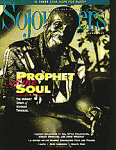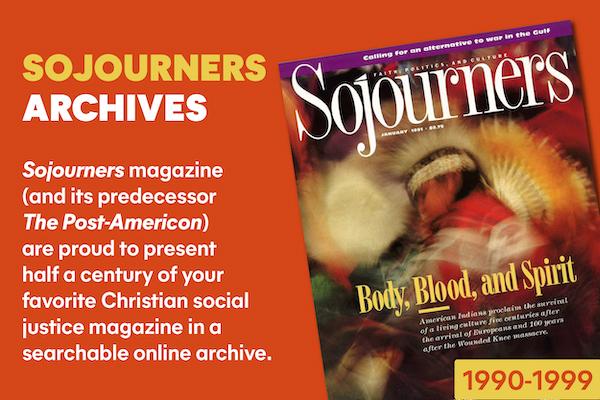When, near the end of his life, Howard Thurman was called "one of the greatest spiritual resources of this nation," it was not an exercise in hyperbole. He was an American original, constantly defying categories of every kind, opening a variety of unexpected worlds and uncharted paths. A deeply rooted child of the southern black community, he became a teacher and spiritual guide for thousands of persons of every race, creed, and nationality.--Historian Vincent Harding
Each year the December issue of Sojourners focuses on a person or group of people who give hands, feet, head, and heart to God's multifaceted love and truth. This theme of "incarnation" is a way of celebrating Jesus' birth and the abiding presence of God in today's world.
This year we honor Howard Thurman. A minister, theologian, and teacher, Thurman was a spiritual commentator on a wide range of issues--segregation and racism, relationships between religions, the nourishment of the inner life, and God's special word to the outcast, to name but a few.
Although he was a revered mentor to many in the civil rights movement, and a source of wisdom and inspiration for both contemplatives and activists of numerous creeds, Howard Thurman remains remarkably unknown to many others in the church. This is a great loss, for his story and his words provide rich food for the soul and mind.
BORN IN 1900, Howard Thurman was raised in the close-knit black community of segregated Daytona, Florida, by his mother and grandmother (his father died when Thurman was a boy). Despite the barriers put up by racism and the lack of funds, he passionately pursued his education, graduating from Atlanta's Morehouse College and then Rochester Theological Seminary.
Thurman was ordained as a Baptist minster, but he only served two years in that denomination before pursuing what would be a life spent in many different faith settings. During his far-flung career he served as dean of the chapels at two major universities, co-founded an interracial, interfaith church in San Francisco, and was named an honorary canon of the Cathedral Church of St. John the Divine in New York City. Along the way he wrote many books and founded the Howard Thurman Educational Trust.
That there is a fundamental unity to all life--in all of creation, and certainly within the seemingly fragmented human race--was a guiding conviction for Thurman. He saw the alienation that people forced on one another as an affront to this deep truth, whether it was the soul-distorting structures of segregation, the often bloody competition between different faiths, or the chasms between rich and poor.
This conviction had its roots in Thurman's childhood.His experience of segregation was balanced by an intensely nurturing African-American community and the personal refuge he found in the companionship of nature--the Atlantic Ocean, a favorite oak tree, the river, the night sky. Time spent studying Western mysticism and its ethical implications with Quaker philosopher-mystic Rufus Jones in 1929 helped to "frame in meaning" what Thurman's life had shown him thus far.
But the analyses of faith and social relations that Thurman drew from his experience and study were profoundly confirmed in the mid-'30s, when he and his wife, Sue Bailey Thurman (his partner in his many endeavors, an accomplished musician, and leader in her own right) were invited on a friendship delegation of African-American Christians to India, Burma, and Ceylon (now Sri Lanka). India was in the midst of the struggle to throw off British colonial rule.
Thurman was deeply struck by the painful similarities between the treatment of the Indians by the British and his own experience as an African American in a segregated society. And, as he wrote in his autobiography With Head and Heart, he was repeatedly challenged by Indian students. "If Christianity is not powerless, why is it not changing life in your country and the rest of the world?" they would ask. "If it is powerless, why are you here representing it to us?"
These were questions Thurman had asked himself. Indeed, he had initially refused the invitation to the delegation because he did not want to be seen as a defender of "American Christianity." He had agreed to go only when assured that he would be free to speak from the truth of his own life. As he told one student, "I think the religion of Jesus in its true genius offers me a promising way to work through the conflicts of a disordered world. [But] I make a careful distinction between Christianity and the religion of Jesus. My judgment about slavery and racial prejudice relative to Christianity is far more devastating than yours could ever be."
The culmination of the journey through India was a meeting with Mahatma Gandhi, who eagerly questioned Thurman about the struggle of African Americans. Gandhi noted that it might be through the African Americans that the "unadulterated message of nonviolence" would be delivered to people everywhere.
Thurman left India resolved to proclaim specifically the message that Jesus had for those who were without power in the world and to work to overcome racial barriers in bodies of faith. He was also moved by his encounters with Hindus, Moslems, and Buddhists to search for the common ground of religious life. He held in tension throughout his life the particular and the universal--searching for ways to, as Vincent Harding describes it, "manifest the essential unity of human life and commit ourselves to it on more than sentimental and verbal levels."
Howard Thurman died on April 10, 1981, in San Francisco. Late in his life he was quoted as saying, "I have always felt that a word was being spoken through me and that three-fourths of the time I didn't get it right." Perhaps that is true, but he leaves behind a legacy of changed hearts and lives that stands testimony to the power of the other fourth of the time.
Julie Polter is an associate editor of Sojourners.

Got something to say about what you're reading? We value your feedback!
